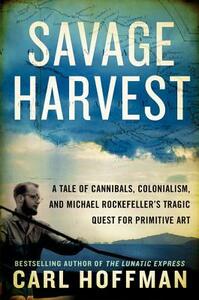Take a photo of a barcode or cover
92 reviews for:
Savage Harvest: A Tale of Cannibals, Colonialism, and Michael Rockefeller's Tragic Quest for Primitive Art
Carl Hoffman
92 reviews for:
Savage Harvest: A Tale of Cannibals, Colonialism, and Michael Rockefeller's Tragic Quest for Primitive Art
Carl Hoffman
informative
reflective
fast-paced
When the book began by seemingly solving the mystery in its first chapter, I wasn't sure there was a point to continuing. But I'm glad I did: big, interesting questions of identity and the meaning of civilization and community, with collateral issues about family and clan allegiances. Fascinating. (See also Chinua Achebe's "Things Fall Apart," which I kept thinking of.)
adventurous
dark
informative
sad
tense
medium-paced
adventurous
dark
informative
sad
medium-paced
I am glad to be done with this book. I found the anthropological aspects of the book to be very interesting which I why I kept reading; but the parts of the book that focused specifically on Rockefeller's possible death were written in the most graphic, gruesome and disturbing terms. Besides the nightmares those passages gave me, they felt like there were phrased that way specifically for the shock value. It's an interesting but disturbing book.
Kind of interesting---did Michael Rockefeller drown off the coast of Papua New Guinea, or was he killed and eaten by headhunters? Despite the fact that you could immediately tell what the author thought, there isn't a lot of real "proof" or anything new, really, but this was still pretty interesting. Skip it if you are too squeamish for descriptions of cannibalistic rituals.
Took a little time for this to get interesting, but once it did it was a very compelling story.
The very idea of cannibalism is truly foreign to most first world people. This book shares a true example that pits ultimate power and wealth (the Rockefellers ) against a primitive community in Indonesia.
There were actually a couple of factors that I had never considered in why and how this practice took place. The most intriguing one is of survival and not from positioning for strength, but in having humans be a source of fat and protein where there is little more than fruits and small fish and crustaceans to eat. The brain is one source from a large animal that, even when taboo, might need to be considered as sustenance.
I do now need to see the art pieces collected by the man who was eaten that are housed in a museum in New York, some of which practically foretell this murder.
There were actually a couple of factors that I had never considered in why and how this practice took place. The most intriguing one is of survival and not from positioning for strength, but in having humans be a source of fat and protein where there is little more than fruits and small fish and crustaceans to eat. The brain is one source from a large animal that, even when taboo, might need to be considered as sustenance.
I do now need to see the art pieces collected by the man who was eaten that are housed in a museum in New York, some of which practically foretell this murder.
Savage Harvest answers no questions but provides great insight into the disappearance of Michael Rockefeller in Indonesia in the 1960's. The book jumps back and forth between present day and 1961 in Asmat, the region where Michael disappeared. It's a fascinating story of a man with too much privilege who collects primitive art and ventures into an area where the taking of art has a consequence. We may never know what really happened to Mr. Rockefeller but Mr. Hoffman provides compelling evidence to suspect the tales of murder and cannibalism might be true.


